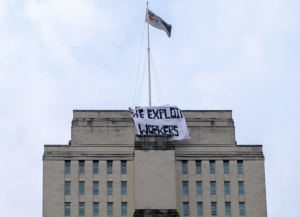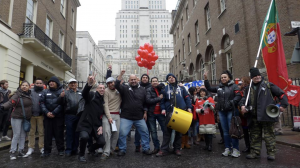TOMMY WALTERS introduces ‘Back In House’, a workers’ campaign to end outsourcing and zero-hours contracts at the University of London.
It seems almost too fitting that Senate House, the building that inspired George Orwell’s Ministry of Truth, is today living up to its connotations of exploitation and hypocrisy. In Orwell’s 1984, the slogan ‘FREEDOM IS SLAVERY’ is ironically plastered across the walls of the ‘enormous pyramidical structures of glittering white concrete, soaring up, terrace after terrace, 300 metres into the air.’ In our parallel universe, workers at the University of London are given the supposed freedom of flexible contracts when outsourced to private contractors, but are in turn underpaid, overworked and deprived of their basic working rights.
On Tuesday 21st November, to coincide with the University of London’s Foundation Day dinner attended by Princess Anne at Senate House, the Independent Workers Union of Great Britain (IWGB) staged a strike and a simultaneous public protest demanding an end to outsourcing at the university.
Security officers and receptionists have been on strike since September, demanding the pay rise they were promised a year ago. They also demand an end to zero-hours contracts that all new workers are employed on, which deprive them of the most basic employment rights such as guaranteed hours and job security.
It is through outsourcing that the University of London is able to get away with these disgraceful employment practices. They claim these working conditions are not their responsibility, but of the contractors they employ to run these services. This results in a situation where security officers and receptionists are employed under worse conditions than the in-house staff that they work alongside.
The IWGB demands three things from the University of London:
- To bring all outsourced staff back in-house
- To give zero-hours workers fixed hour contracts
- For pay rises above the London Living Wage, currently at £10.20 an hour
Watch Savage Broadcast’s video here:
“We have seen a great injustice,” says IWGB President Henry Chango Lopez, a porter at the University of London, “where workers have sometimes not been paid for months and have been fired without warning.”
Zero hours contracts allow for the exploitation of workers by private middleman companies such as Cordant Security, the facilities management firm that manages security staff at UoL. Rather than paying wages for work, these companies pay workers a fee for a service – meaning they aren’t responsible for their employees and workers are left with worse pensions, sick pay and holiday pay entitlements than their in-house colleagues.
Currently, workers are paid as low as £9.25 an hour, which fails to meet the current London Living Wage, set at £10.20 an hour. This means many of those on supposedly ‘flexible’ zero hours contracts have to work 70 hour weeks in order to earn enough money to get by. Chango Lopez contrasts this with the salaries of the management:
“Since 2012, the University of London has tripled the number of staff earning over £100,000. The Vice-Chancellor’s salary has increased from £153,000 to £173,400, yet it claims it doesn’t have the money to improve the salaries of its lowest paid staff.” This salary can be calculated at 19 times more than the typical worker at the University, who is left with £9,000 annually after tax.
“Every time we go to the university to complain about poor pay or conditions, they hide behind the outsourcing companies and say it isn’t their responsibility. This has to stop and we are going to put an end to it.”
In fact, outsourcing is not financially beneficial to either party. A leaked University of London file revealed a managing director had admitted that outsourcing had pushed up costs and made services even worse.
Katherine Morrissey, the IWGB Women’s Officer, explains: “when you outsource people to these companies, the justification for it is that they are experts in this and you’ll get a more efficient service for a cheaper price. What actually happens is you get a worse service because the companies are trying to cut costs and save money so their profit margins are bigger.”
“This means the client gets a worse service and the people that have to work for those companies end up having terrible issues with discrimination, bullying and poor terms and conditions compared to the people [who are employed directly by the University] that they work alongside every day within these buildings.”

Solidarity with Migrants
The injustice also reflects and reproduces the deep-rooted structural discrimination faced by migrant workers in the UK. The workforce employed in-house directly by the University of London are predominantly white and British, whereas the outsourced workforce is made up of mainly migrants, namely from Peru, Colombia, Venezuela and Ecuador. This two-tiered system could not be a more clear example of the ongoing institutionalised discrimination in our educational institutions.
María Isabela is handing out chocolates at the strike. Originally from Ecuador, she spent five years working in Spain before coming to London to work as a cleaner at the University of London. She leaves for work from Walthamstow at 5am while most of London sleeps. On her two-hour bus journey she whatsapps her family in Ecuador, who send her psalms that she likes to memorise and recite with her husband, Rodrigo, also a cleaner at the University of London.
An average day for her starts at 7am, and becomes harder later on once the buildings get busier and rubbish piles up. The essential role María Isabela and her husband play at the University of London passes silently by, rarely seen and most often unrecognised.
María Isabela is paid under the London Living Wage, which means she earns only enough to look to her short-term future. “My hope to one day see my family in Ecuador or bring them here to visit at the moment seems impossible.”
When María Isabela falls ill, she is not paid for the first three days by Cordant, the private contractor that employs her to clean at UoL. “They look at us like we are nothing.”
She is undervalued because of her ethnicity and her profession as a cleaner. It seems impossible to imagine that other service professions experience the same prejudice. The idea that you could walk into Caffè Nero, be served by barista who, independently outsourced to a contractor, makes the coffee for you and then pays a commission to Nero to serve you that coffee seems ludicrous. Why, then, should this form of exploitation be exclusive to other service professions?

The bigger picture
María Isabela was overjoyed to see the attendance from workers and supporters, migrants and non-migrants alike at IWGB’s protest in November. Coming from an isolated Latin American community in London, she had no idea that so many others would be there to stand with her. The protest was attended by couriers and those from the recent McDonalds and Ritzy Picturehouse strikes. Others from outsourcing victories elsewhere, such as SOAS and LSE’s came along to voice their support. Hard-fought successes in the past have shown that campaigns like these are winnable battles.
In many ways, we should be looking to the bigger picture to build a movement to end mass exploitation. This purposeful shirking of the employment status of university workers through zero-hours contracts and outsourcing should be considered alongside the struggle of workers in the gig economy. Companies such as Uber and Deliveroo have flouted the law by reclassifying the status of their workers to deny them minimum wage or paid holidays. In both cases, the employers benefit from the fruits of others’ labour whilst insulating themselves from the legal and moral responsibilities of according their workers the basic rights they are entitled to.
Unions like IWGB are key to bridging the seemingly different struggles of subcontracted cleaners and exploited Uber drivers. Their work is crucial in representing precarious workers who are neglected and increasingly underpaid. The mistreatment of outsourced workers – and those on zero hours contracts in general – needs to be made visible, and we need to work collectively to ensure that a brighter future for those like María Isabela is in sight.
The IWGB is currently filing a legal case before the Central Arbitration Committee (CAC) against the University of London aiming to see a ruling that would make UoL responsible alongside any subcontractor for the conditions of outsourced workers. It will argue that ‘denying these workers the right to collectively bargain with their de-facto employer is a breach of article 11 of the European Convention on Human Rights.’
An initial report of the campaign has now gone to the Vice-Chancellor of the University of London, and the results of staff survey will be released by the end of January.
A second protest and strike to end outsourcing at the University of London will be taking place on 25th January.
Support the campaign here.
Featured image courtesy of Maja Kuzmanovic.





